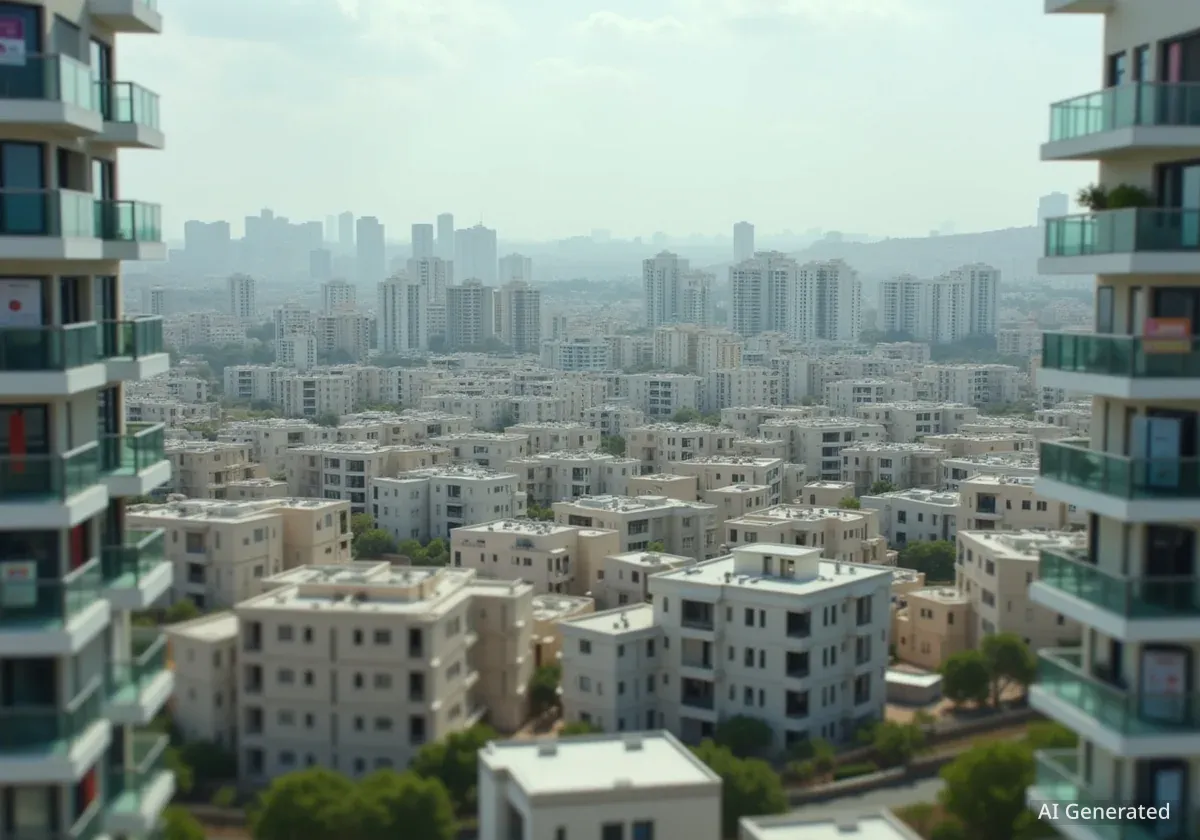After a prolonged period of steep price increases, Israel's real estate market is showing clear signs of a slowdown. A combination of record-high housing inventory, elevated interest rates, and economic uncertainty has led to a sustained drop in home prices and sales volume, challenging the long-held belief that the market would only continue to rise.
Industry experts suggest this shift represents a market correction, with some areas seeing price reductions of up to 20% from their peak. While the ongoing conflict adds to economic pressure, analysts note that the cooling trend began before recent hostilities, driven by fundamental economic factors.
Key Takeaways
- A record 83,000 new apartments are currently for sale in Israel, creating an unprecedented supply glut.
- Home prices have experienced several consecutive months of decline, though they remain higher than a year ago.
- High interest rates, now at 4.5%, have significantly increased borrowing costs and dampened buyer demand.
- Despite the domestic slowdown, demand from overseas buyers, particularly from Jewish communities abroad, remains strong.
- Experts are divided on the future, with some predicting a rebound after the war and others warning of a potential extended downturn.
A Market Reaching Its Limit
For years, rising home values were a constant in the Israeli economy. However, a recent analysis from the Central Bureau of Statistics reveals a shift. Data showed home prices fell for five consecutive months, declining by approximately 1.5% since March, although a slight 0.8% rebound was noted in preliminary August figures.
This decline follows a period of intense growth that saw property values increase by around 40% over the last five years. Now, affordability has become a major hurdle for domestic buyers. "There’s a limit to how much people can pay," said Yitzchak Kowalsky, CEO of YKK Jerusalem Real Estate. "I work with a lot of very wealthy people, and they are telling me they’re not willing to pay the prices people are asking now."
Sales Volume and Seller Flexibility
The slowdown is also reflected in the number of transactions. According to Finance Ministry data, home sale volumes have been consistently lower year-over-year since peaking in late 2022. This has forced sellers to adjust their expectations.
"During COVID, sellers wouldn’t even talk to you if you wanted to negotiate on the asking price," noted Noah Sander, an agent with Daon Group Real Estate in Tel Aviv. "Now, people are being more flexible behind the scenes."
Sander believes the market is undergoing a necessary correction rather than a collapse, estimating that prices for second-hand apartments in some areas are already 15-20% lower than their peak.
By the Numbers: Market Indicators
- 83,000: Record number of new apartments available for sale.
- 4.5%: The current benchmark interest rate, up from a low of 0.1%.
- 40%: Approximate price increase over the past five years.
- 1.5%: Price drop recorded over a recent five-month period.
Economic Pressures and Policy Changes
Several factors are contributing to the cooling market, with some predating the current conflict in Gaza. The most significant is the sharp rise in borrowing costs. The Bank of Israel has raised the benchmark interest rate to 4.5% from a historic low of 0.1%, making mortgages significantly more expensive for potential buyers.
"I work mainly in Tel Aviv, and we already started to see a slowdown in the market for second-hand homes at the beginning of 2023, before the war started," Sander explained. "Prices already started falling then, even if the official data wasn’t showing it."
The Impact of a Stronger Shekel
Currency fluctuations have also played a role, particularly for overseas buyers. The shekel has strengthened against the dollar, trading below NIS 3.35 compared to NIS 3.78 a year ago. This makes Israeli property more expensive for those purchasing with foreign currency.
Record Supply Meets Tighter Regulation
A construction boom aimed at addressing previous housing shortages has resulted in a market surplus. With nearly 83,000 new apartments now listed for sale, supply is outpacing demand in many areas. "There is more stock of new apartments available than ever before," Sander added. "Many developers are starting to drop prices or be a lot more flexible in negotiations."
Government policies have also tightened the market. An increase in the VAT sales tax from 17% to 18% added to the cost for homebuyers. Additionally, the Bank of Israel introduced restrictions on financing packages offered by contractors, which had previously allowed buyers to defer large payments until construction was complete. This popular but risky scheme was curtailed in March to protect the country's banking system.
The Role of Conflict and Overseas Buyers
While the market slowdown was already underway, the war has amplified economic uncertainty. Prof. Zvi Wiener of the Hebrew University Business School stated, "There is no question that the war has a significant impact on the economy, and that directly affects the real estate market. Between the government costs of running a war, increased uncertainty... it is natural that prices will go down."
This uncertainty has caused many domestic buyers to delay their purchasing decisions. However, a different trend is emerging among Jewish communities abroad. Agents report a surge in interest from overseas buyers, particularly from the United States, who are motivated by concerns over rising antisemitism.
"I’ve only seen an increase in sales to American Jews since the war started," said Kim Bash, who runs a real estate agency in Jerusalem. "People get a sense of security knowing that they have a foothold here, and they believe that the future of the Jewish people is in Israel."
This international demand is focused on major cities like Jerusalem and Tel Aviv, but also growing in areas such as Ashkelon, Netanya, and Modiin.
New Priorities for Buyers
The security situation has also changed what buyers look for in a property. According to Kowalsky, the presence of a reinforced protected room (known as a "mamad") has become a top priority, often more important than parking.
"It used to be that the first thing people asked about would be parking. Now, it’s whether there is a protected room," he said. "If there isn’t, you’re talking about a price deduction of 15-20%."
Future Market Outlooks Vary
Looking ahead, experts offer differing forecasts for Israel's real estate market. The path forward depends heavily on the duration of the war, future interest rate policies, and the overall health of the Israeli economy.
Professor Wiener expressed caution about a more pessimistic scenario. "It is possible that the entire economy — including the real estate market — could fall into a long economic downturn," he warned. He noted that while the Israeli economy is structurally strong, a serious decline "is not a negligible possibility."
Others are more optimistic. Noah Sander predicts a post-war rebound. "I think there will be a natural euphoria when the war ends, and a lot of people will buy, driving prices back up," he said. "If the central bank lowers interest rates, that would add a further jolt to the market."
Ultimately, macroeconomic factors may be the deciding influence, especially for foreign investors. "If interest rates go down and the dollar is strong, more buyers will come to the market," Kowalsky concluded. "Otherwise, they might not."





